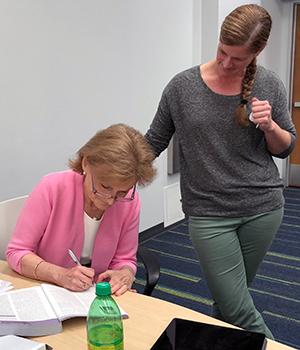Imagine hearing firsthand from one of the preeminent health policymakers in the country about how health care policy is made and about various strategies nurses can use to help improve health care access.

That’s exactly what happened to students in Dr. Stephanie Morgan’s doctor of nursing practice (DNP) Health Policy class when Mary Wakefield, PhD, RN, FAAN and former acting deputy secretary for the U.S. Department of Health and Human Services came for a visit. During the time with the students, Wakefield, who joined The University of Texas at Austin School of Nursing’s faculty in fall 2017, described how access, affordability and quality of health care for patients seen by nurse practitioners and other clinicians is heavily influenced by policy actions that hail from outside the health care sector.
Just as the next generation of nurses requires knowledge to help them shape the health of their patients, so too, they need knowledge to help shape health policies that will also impact their patients’ health, she told them.

“Improving the health of individuals and health care requires nurses to lean into and lead change in both health policy and health care,” Wakefield said. “Our conversation in class considered the ability of public policy decisions to fortify the nation’s capacity to respond to health care and public health challenges, and, conversely, to erode consumer protections and public health. Given their education and expertise, the ideas and research generated by this cohort of DNP students should help directly inform health policies at local, state and national levels that benefit the patients for whom they care. In doing so, nurse practitioners impact not only health care delivered today but health care that will be delivered going forward.”
She also discussed the expanding opportunities and increasing expectations for future nurse clinicians to influence the forces outside of health care that impact the health of people who receive their care.
“Although much of the work these students ultimately do will occur within health care systems, some of their important contributions also will be made through influencing and informing public policies that impact on the health of individuals and communities,” Wakefield said. “As nurses, we discussed some strategies they can use to meaningfully contribute to policy-driven changes in health care that will have a substantive impact on peoples’ health.”
In addition to the UT Austin School of Nursing, Wakefield also joined the LBJ School of Public Affairs and is serving as visiting professor and distinguished fellow of the Joseph H. Blades Centennial Memorial Professorship in Nursing. Since then she has presented a seminar series exploring the nexus of health-related research and public policy, applying her expertise in health care policy that was honed over many years in public and private institutions of higher education, the political arena, and governmental agencies.
“Dr. Wakefield is passionate about nursing and health care politics and policy,” said Sharon Carter, MS, RN, CCRN, and Clinical Nursing instructor. “Her enthusiasm and passion for registered nurses to be more involved in this area was evident. As someone who has never been a politically minded individual, I was very interested in learning more, but was also very uncertain about the topic. Dr. Wakefield was able to help me understand health care policy and politics in a way that I had never thought of before.

“She stated that an important aspect of nursing was advocating for patients, and that health care policy is about advocating for all patients. I had never thought about it in those terms before. Her perspective has given me a better understanding about health care policy that makes me feel empowered to do more,” added Carter, who is enrolled in the DNP course.
Wakefield, who earned both her master's (1978) and doctoral (1985) degrees from UT Austin's School of Nursing, has built a distinguished career around the country and the world. She is a fellow in the American Academy of Nursing and was elected to the Institute of Medicine of the National Academies in 2004, one of the highest honors in medicine and health. In 2013, she was named the UT Austin Graduate School’s Outstanding Graduate Alumnus.
She was chosen by President Barack Obama in 2009 to head the Health Resources and Services Administration (HRSA), a division of the Health and Human Services Department that provides primary health care to 24 million people living in rural and urban communities that don’t have access to basic health services. As head of HRSA, she oversaw a $7.5 billion agency that funds 3,000 grant recipients in 80 different programs. She also administered $2.5 billion in 2009 stimulus funds to expand the nation’s health-care system and address workforce shortages in the health professions.
“Dr. Wakefield is one of our most outstanding alumni, and we were honored to have her join the faculty this year,” Dean Alexa Stuifbergen said. “She has used her UT Austin education to serve the public and make a substantial difference in health care access and delivery and was gracious enough to share her experiences as a national leader with our students. During her visit with the DNP students, she made quite clear that she always draws on her experiences and education as a nurse to inform health care policy decisions. That is an important message for our students and faculty to hear.”